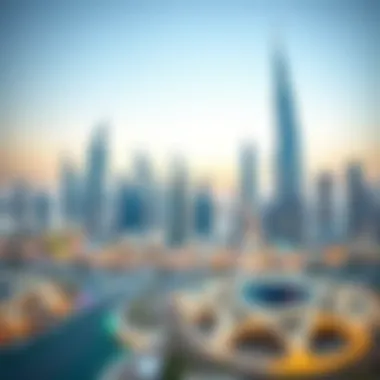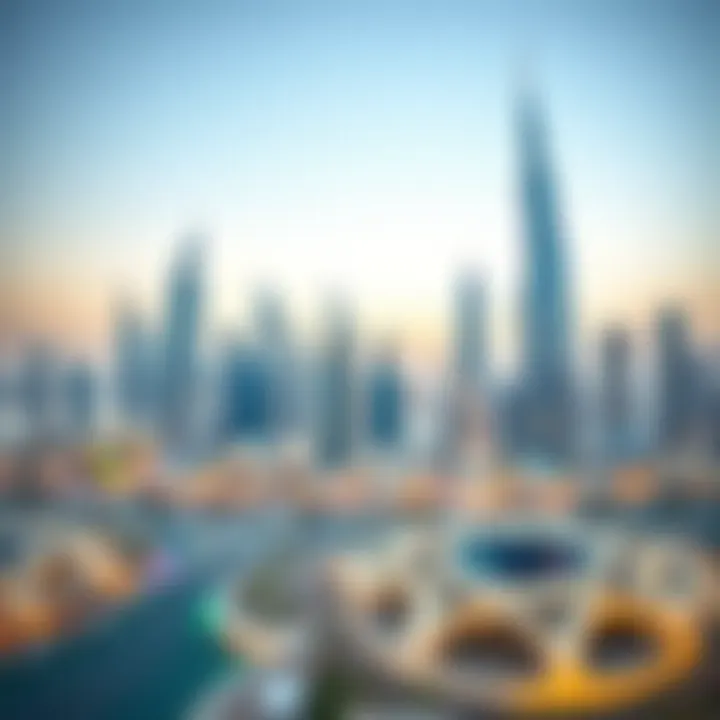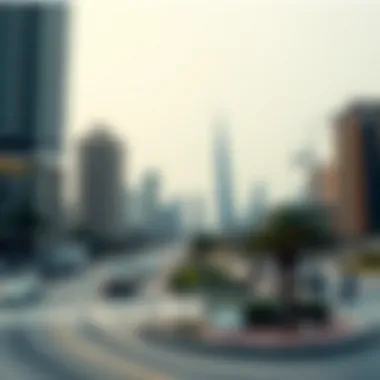Insights into the Dynamic Dubai Real Estate Market


Intro
Dubai's real estate market is a mosaic of opportunities, trends, and a vibrant lifestyle. It stands as a beacon for investors, expatriates, and real estate agents alike. With its towering skyscrapers and palm-lined beaches, Dubai offers not only stunning properties but also a unique lifestyle that captivates many. Understanding this market is essential for anyone looking to navigate its intricacies, whether you’re an investor scouting for the next big opportunity or an expatriate searching for a home.
As part of our exploration, we will delve into the market analysis, uncover neighborhood highlights, and examine the amenities that make this city a favorite among many. You can expect vital insights tailored to both seasoned investors and newcomers to the Dubai property market.
The fascinating blend of luxury and accessibility is what sets Dubai apart. Various factors influence the real estate scene, including regulatory frameworks, market dynamics, and social trends. So, sit tight as we embark on this journey through the unique landscape of Dubai's realty.
Prelude to Dubai Realty
Dubai, a city synonymous with innovation and grandeur, has emerged as a global hotspot for real estate investment. The importance of exploring Dubai's realty market cannot be overstated. For both seasoned investors and newcomers alike, understanding the intricacies of this vibrant market is crucial. In an environment where skyscrapers pierce the sky and sprawling developments redefine urban living, potential buyers must grasp the unique dynamics at play.
The Dubai real estate sector is characterized by rapid growth, fueled by both local and international demand. With a mix of luxurious properties, affordable housing, and commercial investments, there is something for everyone. Investors are drawn to the promise of lucrative returns, particularly given the city's strategic location as a hub between East and West
In this article, the relevance of Dubai's realty landscape will be explored through various lenses:
- Current trends that shape the market, offering insights into what buyers can expect
- An overview of investment opportunities available, broken down into different property types
- Regulatory factors affecting investors, which can be a maze requiring guidance
- Details on neighborhood dynamics, showcasing where expatriates thrive vs. emerging areas for the astute investor
Dubai's property scene is not simply about transacting real estate; it intertwines with lifestyle, culture, and the aspirations of those who call it home.
Investors are particularly interested in the high rental yields the city is known for, alongside its growing populace eager for modern living spaces. The continued development of infrastructure, coupled with robust government initiatives, adds to the appeal.
From luxury apartments in the heart of Downtown Dubai to serene villas in Palm Jumeirah, the options are as diverse as the people that inhabit them. Each area has its character and advantages, making it crucial for potential buyers to identify their specific needs and goals.
Ultimately, understanding the intricacies of Dubai's urban fabric is essential for making well-informed decisions in this ever-shifting market. Whether you're a real estate agent aiming to provide top-notch service or an expatriate searching for a new home, this guide seeks to unpack the layers of information surrounding Dubai's dynamic real estate environment.
"Dubai is not just a place; it’s an experience, echoing dreams of ambition and wealth through its architectural marvels."
To dive deeper into what makes Dubai's real estate market tick, stay tuned for subsequent sections that will unpack its rich history, current trends, and future outlook. This journey will equip you with the knowledge and insights necessary to navigate this bustling sector successfully.
Historical Context of Dubai's Real Estate Market
Understanding the historical context of Dubai's real estate market is crucial for anyone looking to invest or navigate this complex landscape. The evolution of the market provides insights into how past events, regulatory changes, and global influences have shaped the current environment. Knowing the journey of Dubai’s development helps investors anticipate future trends and possible challenges they might encounter.
Throughout the decades, the real estate sector in Dubai has transitioned from humble beginnings to a booming hub that attracts international investment. With an economy largely based on oil during the mid-20th century, the shift towards tourism and trade laid the groundwork for urban development, infusing life into Dubai’s skyline.
Evolution through the Decades
Dubai's real estate market has witnessed substantial changes since the 1960s. In the early days, infrastructure was minimal, and the population was primarily comprised of local Emiratis and some settlers from neighboring regions. Houses were modest, and real estate was not a prime focus until the 1970s, when a surge in oil revenues enabled significant investments in infrastructure projects.
- 1970s-1980s: These decades marked the beginning of a conscious effort by the government to diversify the economy. Major projects, like the Dubai International Airport, set the stage for rapid urbanization. The introduction of freehold properties in the late 1980s allowed foreigners to buy properties for the first time, signaling a shift towards a more open economy.
- 1990s: The 90s brought forth developments like the Dubai Marina and Burj Al Arab, enhancing the luxurious image of Dubai. Economic diversification efforts led to a boom in both commercial and residential real estate, attracting expatriates and investors at an unprecedented rate.
- 2000s: With the introduction of property laws that further eased foreign investment, developers like Emaar and Damac began putting Dubai on the world map of luxury real estate. High-profile projects like the Burj Khalifa and Palm Jumeirah became icons of the city’s ambition and success.
Key Milestones in Development
Several key milestones indelibly marked Dubai's real estate trajectory, playing a pivotal role in its growth story.
- Establishment of the Dubai Land Department (2006): This was a landmark move in establishing regulatory practices within the real estate market, giving investors a trusted authority to interact with.
- Property Ownership Reforms (2002): Foreign ownership was allowed in several developments, which instantly made Dubai an attractive investment destination for expatriates looking to settle in the UAE.
- Global Financial Crisis (2008): Although this event had a profound negative impact on global markets, Dubai found a way to rebound, refining its approach towards real estate. Properties went through corrections, but this also paved the way for a more measured and sustainable growth.
- Expo 2020 (postponed to 2021): This event significantly lifted the profile of Dubai, showcasing the city’s development capabilities to a global audience and enhancing investor confidence.
"The history of Dubai's real estate is a testament to resilience and strategic vision, turning the desert into a metropolis that speaks to ambition and opportunity."
To sum up, the historical context of Dubai's real estate market offers a lens to understand its present and future. Investors can benefit from this rich history when navigating the complexities of this vibrant sector.
Current Market Trends
Understanding the current market trends in Dubai realty is crucial for anyone looking to invest or simply gain deeper insights into this dynamic sector. The rapid changes, influenced by various global and local factors, can create a fluctuating landscape, where opportunities can rise and fall almost overnight. Thus, staying informed about these trends not only helps in making savvy investment decisions but also in adapting to the evolving market conditions. In Dubai’s bustling environment, knowledge is as good as gold.


Demand and Supply Analysis
The demand and supply analysis serves as a cornerstone for comprehending the real estate market in Dubai. The influx of expatriates seeking employment, coupled with local residents looking for upgraded residences, drives a healthy demand for both residential and commercial properties. This demand is notably high in well-established neighborhoods such as Dubai Marina and Downtown Dubai.
When we look at supply, developers continually strive to meet this rising demand. Many projects are springing up, aiming to fill the gaps in the market. However, challenges arise when supply outpaces demand, leading to potential oversaturation. From a buyer's perspective, knowing this balance helps in timing their purchase. For example, when supply is high and properties linger on the market longer, buyers may have more room to negotiate on price.
"Investors need to keep a sharp eye on the balance between supply and demand to ensure they're navigating the market wisely."
Price Fluctuation Patterns
Understanding price fluctuation patterns in Dubai realty can feel like trying to hit a moving target, but it's pivotal for investors. Seasonal variations significantly sway prices; for instance, during the summer months, when temperatures soar, there’s often a slight dip in transactions as many expatriates return home for vacations. However, as the cooler months roll in, activity typically spikes.
Price trends can also be geographical. Areas undergoing development or experiencing regeneration often see rising prices, while regions that are stagnant may not yield the same. It’s not uncommon to see prices in Dubai’s prime locations like Palm Jumeirah steadily climbing, while more peripheral areas may lag behind.
Furthermore, economic factors, such as fluctuations in oil prices or political stability, play a significant role. Investors should keep an eye on the global economic climate, as it can impact personal wealth and, subsequently, the housing market in Dubai.
In summary, both demand and supply, alongside price fluctuations, require thorough understanding and regular updates. By navigating these trends wisely, potential buyers and investors can seize opportunities with both hands.
Investment Opportunities in Dubai
Exploring investment opportunities in Dubai is not just about numbers; it’s about understanding the pulse of a city that has transformed itself into a global hub. The potential for returns in this thriving market can appeal to both seasoned investors and newcomers alike. Dubai's dynamic economy, driven by tourism, trade, and finance, creates a fertile ground for various real estate ventures. Investors can tap into a range of options that suit different appetites for risk and investment styles.
Types of Properties for Investment
Residential Properties
Residential properties make up a considerable portion of the Dubai real estate market, encompassing apartments, villas, and townhouses. These properties often attract expatriates looking for places to call home. The appeal lies in the diverse offerings: from luxurious high-rise apartments with spectacular views of the Burj Khalifa in Downtown Dubai to family-friendly villas in areas like Arabian Ranches.
- Key characteristic: Many residential neighborhoods are designed with a focus on community living, featuring parks, schools, and easy access to public transport.
- Unique feature: The vast variety of choices allows investors to buy properties that meet their financial goals while benefiting from high demand in expat communities.
- Advantages/disadvantages: While residential properties can yield consistent rental income, the initial investment may be on the higher side. Market saturation in certain areas can also pose challenges.
Commercial Properties
When it comes to commercial properties, they include retail spaces, offices, and mixed-use developments. These types of properties cater to businesses, and while they can require a more substantial investment, the potential returns can be enticing. The commercial sector was buzzing with activity, particularly in areas like Dubai Marina and JLT, where start-ups and established firms are setting up shop.
- Key characteristic: Commercial properties often come with longer lease periods, typically reducing the risk of vacancy.
- Unique feature: The rapid growth of Dubai as a business hub means commercial spaces are usually in high demand.
- Advantages/disadvantages: While the returns may be more attractive compared to residential properties, these investments can be influenced by economic downturns. Investors need to weigh the risk against the potential for high yields.
Off-plan Developments
Delving into off-plan developments can be a gamble, but for many investors, the potential rewards far outweigh the risks. These properties are sold before they have been completed, allowing buyers to secure a discount compared to fully completed homes. Investors in off-plan developments often see substantial appreciation in property value by the time completion occurs.
- Key characteristic: These developments are usually marketed as modern and equipped with the latest amenities, reflecting current housing trends.
- Unique feature: With off-plan properties, investors can often choose customizations that suit current trends and personal preferences.
- Advantages/disadvantages: Although the lower entry price can be enticing, there's always the uncertainty of project completion and the potential for delays. Buyers should be prepared for this possibility.
ROI and Rental Yields
Analyzing return on investment (ROI) and rental yields is crucial for any investor looking at Dubai's real estate market. In general, residential properties in sought-after locations tend to provide stable rental yields, often hovering around 7-9% per annum. Commercial properties can yield upwards of 10% but can be more volatile, depending on market conditions. Understanding these figures helps investors align their strategies with their risk tolerance and financial goals.
Dubai also provides specific tax incentives that make investing in its real estate all the more appealing. No capital gains tax is levied on the sale of properties, which can enhance the overall returns on investment. It’s vital for investors to conduct thorough research, seek out local expert advice, and consider emerging districts that offer promising futures.
Regulatory Environment
Understanding the regulatory environment in Dubai's real estate sector is crucial for anyone looking to invest, buy property, or navigate the complexities of the market. Laws and regulations establish a framework that dictates ownership rights, transaction processes, and the legalities of property investment. Without a clear grasp of these elements, potential pitfalls could lead to financial losses or legal complications.
Property Ownership Laws
In Dubai, property ownership laws create a unique landscape that attracts investors from around the globe. Since the introduction of freehold ownership in 2002, foreign nationals have been allowed to own property in designated areas. This shift marked a significant move toward transforming Dubai into a global business hub.
Key points to consider include:


- Freehold vs. Leasehold: Under the freehold system, expatriates can own land and buildings outright, while leasehold ownership allows ownership for a specific period (typically 99 years), after which the property reverts to the landowner.
- Designated Areas: Foreign ownership is limited to specific zones such as Dubai Marina, Downtown Dubai, and Palm Jumeirah. Understanding one’s options within these boundaries is vital.
- Regulations of the Dubai Land Department: The Dubai Land Department enforces various laws that govern property transactions, ensuring transparency and security in ownership. They also set forth rules on property registration, title deeds, and mortgage processes that buyers must follow.
"Dubai’s laws make it a veritable playground for investors. However, one must tread carefully and understand the governing landscape!"
Legal Considerations for Buyers
Before making any purchase, buyers must be aware of the legal aspects tied to real estate transactions in Dubai. This involves more than simply signing on the dotted line; there are a host of factors that must be considered to mitigate risks.
- Due Diligence: It’s essential to conduct thorough research on the property not only to ensure it is legit, but also to examine its legal status. This includes verifying the seller’s ownership and any outstanding debts tied to the property.
- Contracts: Before finalizing a deal, buyers should carefully review the Sales and Purchase Agreement (SPA) and seek legal counsel if needed. Contracts typically outline payment schedules, penalties for delays, and other crucial terms.
- Fees and Taxes: Additional costs such as registration fees, transfer fees, and property taxes can sneak up on unwary buyers. Familiarity with financial obligations upfront can safeguard against unexpected financial strain.
- Title Deed Registration: After completing a transaction, it’s essential to register the title deed in the buyer’s name at the Dubai Land Department. Failing to do so can lead to a lack of legal recourse should disputes arise.
- Understanding Contract Laws: Knowledge of local contract laws can be a game changer, especially in a foreign market. Buyers should know their rights in case of default or misrepresentation by sellers.
In summary, navigating the regulatory environment in Dubai’s real estate market is a multilayered endeavor. From ownership laws to legal considerations, each aspect plays an integral role in ensuring a successful property investment journey. Armed with the right information, investors can capitalize on the opportunities Dubai's dynamic real estate market offers.
Neighborhood Insights
Understanding the neighborhoods of Dubai plays a crucial role in navigating its real estate landscape. Each district in this bustling metropolis has its unique flavor, catering to a variety of lifestyles, preferences, and budgets. This section shines a light on why these insights are invaluable not just for homeowners but also for investors and expatriates looking to make informed decisions when purchasing property.
The neighborhoods in Dubai are often defined by their amenities, cultural environments, and accessibility. Potential buyers should consider what each district offers and how it aligns with their lifestyle needs. For instance, proximity to schools, shopping centers, and transportation hubs can significantly impact the living experience. Furthermore, rental yields differ across areas, influencing investment choices.
Looking at these neighborhoods, investors will find that some areas provide steady growth because of their location and demographic appeal. Meanwhile, expatriates may seek communities that provide a sense of belonging and familiarity, which in turn can lead to vibrant community dynamics. Understanding these considerations can lead to better investment strategies while also enhancing the living experience.
Popular Districts for Expatriates
Expatriates often gravitate towards certain neighborhoods that provide both comfort and convenience. Here are some of the most sought-after districts:
- Dubai Marina: Known for its stunning waterfront views, Dubai Marina is a favorite among expatriates. The lively atmosphere is complemented by beaches, restaurants, and nightlife.
- Downtown Dubai: Home to the iconic Burj Khalifa, this area is a blend of luxury living and urban convenience. Expatriates enjoy the proximity to cultural attractions and high-end shopping.
- Jumeirah Lake Towers (JLT): This community features a multi-cultural vibe with beautiful lakes and parks. JLT is ideal for those who want a mix of residential and commercial spaces, making it a bustling area for professionals.
- Al Barsha: Well-regarded among families for its schools and parks, Al Barsha offers a quieter lifestyle while being near the Mall of the Emirates, providing ample shopping and entertainment options.
Each of these areas has its distinct characteristics, yet they all provide a strong community feel, essential for expatriates settling into a new country.
Emerging Areas of Interest
As Dubai continues to evolve, several neighborhoods are gaining traction among investors and buyers looking for the next promising area. Emerging neighborhoods often present unique opportunities:
- Dubai South: This district is rapidly developing, with plans for the Expo 2020 site. The infrastructure investment here makes it an attractive option for those looking to capitalize on future growth potential.
- Meydan City: Known for its luxurious living and the famous Meydan Racecourse, this area combines residential, commercial, and recreational facilities, becoming increasingly popular among buyers looking for modern homes.
- Arabian Ranches: While traditionally a family favorite, there’s been a surge in interest from younger buyers drawn to its suburban atmosphere combined with modern amenities.
- Jumeirah Village Circle (JVC): This area is often praised for its affordability yet offers high-quality living options. With parks and schools, JVC is appealing to both families and individual investors.
These areas represent the shifting dynamics within Dubai's real estate market. By identifying up-and-coming neighborhoods, investors can position themselves advantageously before prices rise.
In summary, the understanding of neighborhood insights in Dubai is pivotal. Knowing the characteristics of popular districts and emerging areas can provide significant advantages for expatriates and investors alike.
"Select your neighborhood wisely, as it shapes not just the home you choose, but the lifestyle you lead."
For more detailed insights into specific neighborhoods, check out Dubai Land Department and local real estate forums on platforms like Reddit.
Lifestyle Considerations
When exploring the Dubai real estate landscape, it is vital to understand the lifestyle considerations that can significantly influence a buyer's or investor's decisions. The choices made in terms of property often reflect desires for convenience, community, and quality of life. In Dubai, these factors are intertwined with the cultural essence and modern conveniences this city has to offer.
Cultural Dynamics in Dubai
Cultural dynamics play a major role in determining the lifestyle here. Dubai is a melting pot of cultures, boasting residents from all walks of life. About 85% of the population are expatriates, bringing with them unique traditions and viewpoints.
This cultural tapestry manifests in various ways:
- Diverse Cuisine: Foodies can indulge in culinary delights from across the globe, from Emirati dishes to Indian, Mediterranean, and Asian cuisines.
- Festivals and Celebrations: The city comes alive during events like Eid, National Day, and the Dubai Shopping Festival, which showcase the rich cultural heritage.
- Family Orientations: Many neighborhoods focus on family-centric amenities, reflecting the values of community and kinship, thus making it appealing to buyers with children.
The fusion of cultures is not just for show; it impacts social interactions and neighborhood dynamics. Buyers can find communities that align with their cultural preferences, whether they seek vibrant areas full of activities or quieter suburbs to raise a family.


Amenities and Infrastructure
In addition to cultural dynamics, the wealth of amenities and infrastructure in Dubai elevates the lifestyle experience. The city is known for its luxurious lifestyle, offering a myriad of amenities designed to cater to residents' needs:
- World-Class Healthcare: Hospitals such as Mediclinic and Dubai Hospital provide top-notch medical services, contributing to peace of mind for residents.
- Educational Institutions: The presence of esteemed schools like Dubai American Academy and British International School reinforces the city’s appeal for families looking to invest long-term.
- Recreational Facilities: Parks, beaches, and sports complexes abound. Communities like Dubai Marina and Jumeirah Beach Residence feature beachfront activities, while places like Zabeel Park offer green spaces for relaxation.
Infrastructure is another strong point in Dubai’s favour. The emirate boasts cutting-edge public transportation systems, including the Metro and a well-maintained road network. The ease of commuting plays a significant role in residents’ quality of life. In bustling areas like Downtown Dubai, everything from shopping to entertainment is within arm's reach, enhancing everyday convenience.
"The blend of cultural richness with modern conveniences makes Dubai more than just a place to live; it's a lifestyle choice."
This harmonious balance between amenities, infrastructure, and cultural dynamics creates a lifestyle that many find attractive, reinforcing Dubai's status as a leading real estate destination.
Challenges in the Real Estate Sector
The real estate sector in Dubai is a bustling hub of activity, but it's not without its share of challenges. Understanding these hurdles is crucial for investors and buyers who seek to navigate this market adeptly. The challenges not only inform strategic decision-making but also shape the future landscape of realty in this vibrant city.
Whether you're a seasoned investor or a first-time buyer, grappling with the complexities of this market is essential. In the context of rapid growth and dynamic change, knowing these pitfalls can help steer clear of potential losses and enhance your investment outcomes.
Market Saturation Risks
As the saying goes,
Future Outlook of Dubai Realty
The future outlook of Dubai's real estate market offers a snapshot of evolving opportunities and challenges that will shape investments and strategies. Understanding this landscape is essential for potential buyers, investors, and industry stakeholders. The dynamic nature of this market signals continued growth spurred by various factors. This section endeavors to outline not just what to expect, but also to provide insights on navigating the terrain effectively.
Projected Market Growth
As we look ahead, projected growth in the Dubai real estate sector is notable. Analysts predict that several factors will drive this expansion:
- Population Growth: A steady influx of expatriates and international businesses continues to bolster population growth. The UAE has become a beacon for those seeking a prosperous environment, attracting talent from around the globe.
- Economic Diversification: The government is actively working to diversify the economy beyond oil revenue. Significant investments in tourism, technology, and infrastructure will indirectly boost the realty sector. Areas such as Dubai's Expo 2020 site have paved the way for new developments which are likely to enhance property demand.
- Regulatory Initiatives: New policies favoring foreign investors, such as ease of ownership and financing options, will attract more buyers. Continued transparency in transactions also reinforces confidence within the market.
"The evolution of Dubai's real estate is not just about buildings; it reflects the aspirations of a globally minded city."
Given these factors, property values are projected to experience a swing upwards. While fluctuations are certainly inherent to any market, the long-term outlook remains optimistic, signaling a profitable horizon for prudent investors.
Technological Innovations in Real Estate
In an age where technology is entwined with every sector, real estate in Dubai is no exception. The incorporation of cutting-edge technology not only boosts operational efficiency but is also fundamentally changing how properties are bought and sold. Key innovations impacting the market include:
- Smart Home Technologies: The demand for smart living solutions is on the rise. Properties equipped with smart technologies not only enhance the living experience but are also viewed as more valuable. Features like energy-efficient systems and home automation systems are increasingly prioritized by buyers.
- Virtual Reality (VR) and Augmented Reality (AR): Real estate agencies are increasingly utilizing VR and AR to provide potential buyers with immersive experiences. Buyers can now explore properties without physically being there, which not only saves time but also allows for broader marketing reach.
- Blockchain Technology: This technology is gaining traction for its potential to streamline property transactions, providing transparency and security. By using blockchain, the cumbersome paperwork can be minimized, and transactions can occur in a more timely and efficient manner.
The future of Dubai's realty scene will likely see these innovations not merely as trends but as essential facets of the purchasing and selling processes, elevating the overall experience for stakeholders.
Overall, the future of Dubai's real estate market hinges on a mix of economic progress, population dynamics, and technological advancements. All these facets intertwine to create a vibrant market, showcasing its immense potential and resilience. Investors looking at this landscape must be ready to adapt, informed by the latest trends and technologies shaping the market.
Culmination
In wrapping up our exploration of Dubai's real estate landscape, it becomes evident that understanding the intricacies of this market is crucial for investors, agents, and expatriates.
The real estate sector in Dubai is not just a collection of buildings; it represents an opportunity to harness the unique economic dynamics and cultural diversities that the city has to offer. Investors must consider how various factors— from regulatory environments to emerging neighborhoods—can significantly impact potential returns. The prospect of favorable rental yields, along with a growing expatriate population, creates a fertile ground for long-term investment.
Moreover, delving into the lifestyle elements surrounding these properties brings a deeper appreciation of why Dubai is more than just a property hotspot. The fusion of modern amenities with traditional cultural aspects contributes to an enriched living experience. Expats looking to settle down or invest will find neighborhoods that cater specifically to their needs, enhancing both quality of life and investment value.
Key Takeaways
- Market Insights: A comprehensive grasp of the current trends and future outlook positions investors to make informed decisions.
- Cultural Context: Understanding the socio-economic fabric of Dubai complements investment strategies, particularly in aligning property features with lifestyle demands.
- Regulatory Awareness: Knowledge of property ownership laws and legal considerations is paramount, ensuring compliance and minimizing risk.
Ultimately, the conclusion of this journey through Dubai's real estate landscape is not just an end, but an invitation to engage with a market that is as dynamic as it is promising. A curious investor with insights into these nuances is better equipped to navigate the challenges and seize opportunities.
"In real estate, knowledge is your best asset. Understanding the market's context, risks, and opportunities can remarkably transform your experience."
For deeper insights and up-to-date information, resources such as Wikipedia, Britannica, and community discussions on platforms like Reddit can be invaluable. Making informed decisions in this ever-evolving landscape ensures not only successful investments but also a fulfilling lifestyle in one of the world's most vibrant cities.











